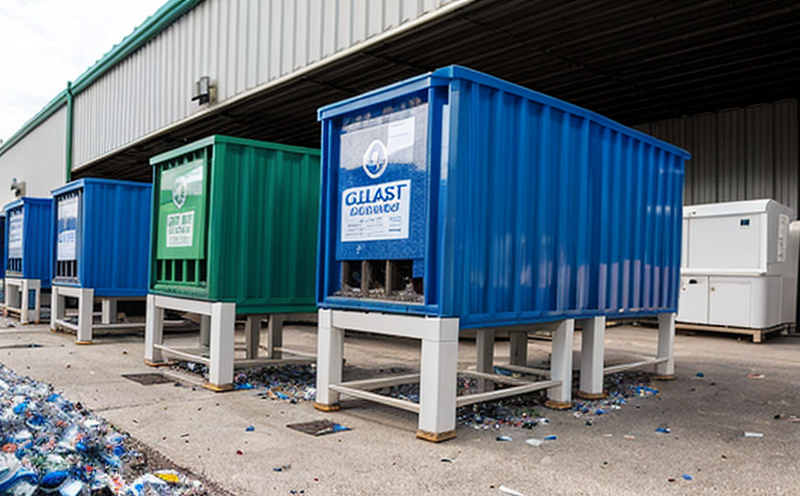EN 12920 Ceramic Waste Thermal Shock Resistance
The European standard EN 12920 specifies methods to determine the thermal shock resistance of ceramic waste. This test is crucial for ensuring that recycled ceramics can withstand high temperatures without cracking, which is essential for their use in various industrial applications such as construction materials and tiles.
Thermal shock resistance is a measure of how well a material can endure sudden temperature changes without fracturing. In the context of ceramic waste recycling, this property ensures that the recycled products will be durable and reliable once integrated into new manufacturing processes. The EN 12920 test simulates real-world conditions where ceramics are subjected to rapid heating followed by cooling cycles.
The standard defines a series of procedures aimed at assessing the thermal shock resistance of ceramic waste pieces under controlled laboratory conditions. These tests help quality managers and compliance officers verify that recycled ceramics meet industry standards, ensuring they can be safely used in manufacturing processes without compromising product integrity.
During testing, specimens are subjected to rapid temperature changes using a specialized furnace or water bath. The specimen is first heated to a specified temperature, allowed to cool for a defined period, and then rapidly cooled by immersion in cold water. This process simulates the thermal stresses that ceramics might encounter during industrial processing.
The key parameters for this test include:
- Temperature range: Typically between 0°C and 1200°C.
- Cooling method: Immersion in a controlled temperature bath.
- Specimen dimensions: Standardized to ensure consistent testing results.
The acceptance criteria for the EN 12920 test are based on visual inspection. Specimens that exhibit no visible cracks or fractures after undergoing thermal shock cycles are considered compliant with the standard.
This test is particularly important in sectors such as construction and manufacturing, where recycled ceramics are used to produce new products. It ensures that these materials meet stringent quality standards, enhancing product reliability and performance.
In summary, EN 12920 provides a robust framework for evaluating the thermal shock resistance of ceramic waste, ensuring that recycled ceramics can withstand industrial processing conditions without compromising their integrity. This testing is vital for maintaining high-quality standards in the recycling industry and for complying with international regulations on waste management and resource recovery.
Eurolab Advantages
At Eurolab, we specialize in providing comprehensive testing services to ensure that your ceramic waste meets the highest quality standards. Our team of experts ensures precision and accuracy in every test performed according to EN 12920. Here are some key advantages our clients experience:
- Comprehensive Testing Services: We offer a full range of testing services tailored to meet your specific needs.
- State-of-the-Art Facilities: Our modern laboratories are equipped with the latest technology and equipment, ensuring reliable test results.
- Dedicated Technical Support: Our team provides technical assistance throughout the testing process, offering guidance on specimen preparation and interpretation of results.
- Compliance Assurance: We ensure that all tests are conducted in accordance with international standards, including EN 12920.
With Eurolab, you can be confident that your ceramic waste will undergo rigorous testing to meet the stringent requirements of the industry. Our commitment to quality and reliability is reflected in our consistent performance and accurate results.
Quality and Reliability Assurance
At Eurolab, we are committed to delivering high-quality, reliable test results that meet international standards. Here’s how we ensure the accuracy and consistency of our EN 12920 ceramic waste thermal shock resistance tests:
- Standardized Procedures: All testing is conducted using standardized procedures as outlined in the EN 12920 standard.
- Certified Personnel: Our team consists of highly trained and certified professionals who are experts in ceramic waste testing.
- Advanced Equipment: We use advanced laboratory equipment to ensure precise and accurate measurements.
- Continuous Monitoring: Our quality control processes involve continuous monitoring and evaluation of test results to identify and address any inconsistencies.
We have a dedicated team that works closely with our clients to ensure that the testing process is efficient and effective. By adhering strictly to international standards, we provide you with confidence in the reliability of your ceramic waste products.
Use Cases and Application Examples
The EN 12920 test for ceramic waste thermal shock resistance is widely used across various industries. Here are some specific applications:
- Construction Industry: Ensures that recycled ceramics can be safely used in construction materials without compromising durability.
- Manufacturing Sector: Guarantees the quality of ceramic products for use in manufacturing processes such as tiles and bricks.
- Environmental Compliance: Helps companies comply with regulations on waste management, ensuring that recycled ceramics meet environmental standards.
In addition to these sectors, the test is also valuable for R&D engineers looking to develop new products using recycled ceramic materials. It allows them to optimize material properties and ensure product reliability.
A typical use case involves a manufacturing company that sources recycled ceramics for its production processes. Before integrating these materials into their supply chain, they perform thermal shock resistance tests according to EN 12920. This ensures that the recycled ceramics can withstand the high temperatures required in industrial processing without cracking or breaking.
Another example is an environmental consulting firm working with municipalities on waste management projects. They use this test to verify that recycled ceramic materials meet the necessary standards for reuse, thereby promoting sustainable practices and reducing landfill waste.





